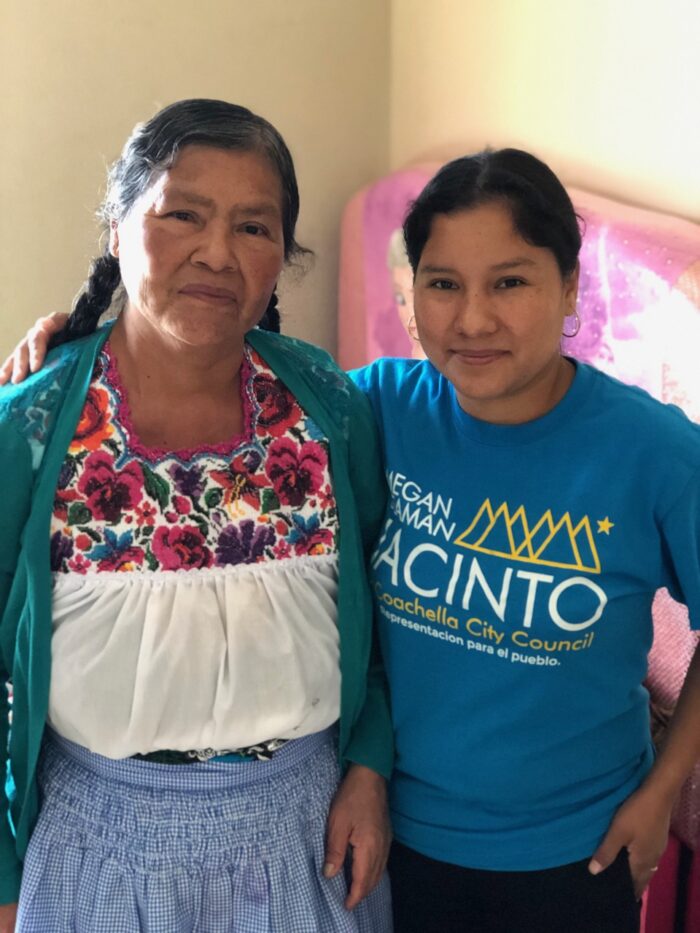Embroidered Craftivism at the Grass Roots
By Mihai Patru
Conchita Pozar’s house is unexpectedly quiet as if her entire family entered a pact of silence to fight the unbearable 125 degrees Fahrenheit. The blazing summer heat is nothing unusual for those living in North Shore – one of the unincorporated communities in Eastern Coachella Valley, Southern California, home to a predominantly Latino migrant population. Besides the scorching heat, a “normal” are also the substandard housing, underdeveloped infrastructure, limited access to basic resources like potable water, public transportation or medical services. Unlike most of the locals, including her family, who get up every morning to find their way to the surrounding fields that feed the nation with fresh produce, Conchita is using her magical needle to join the growing local activist movement.
Wearing a T-Shirt of one of the local candidates in the November elections, Conchita is contemplating the result of that day’s work: a beautiful hand embroidered wall-hanging. It was commissioned a few months back by a family in San Diego who heard of her magical needle. They have no connection to Ocumicho, Conchita’s hometown in Mexico her family left more than a decade ago in search for a better life. Dipping in and out of the bright red velvet cloth, Conchita uses la aguja maravillosa, the magical needle, an ancient embroidery tradition for which the Purépecha indigenous community is famous, to bring to life colorful and complicated designs.

As a Purépecha, she learned the secrets of the magical needle from her mother, a very well-known artisan. Conchita is one of the very few in North Shore, home to an estimated 2,000 Purépecha, who not only masters this tejido – embroidery – technique but is actually practicing it and uses it as a tool to voice her activism. Those who know how to handle the needle prefer to work the fields and secure the necessary income for their families. Plus, wearing the traditional outfits, heavily hand embroidered and decorated, is not at all practical under the Californian sun. The church is the only venue where, on Sundays or special religious celebrations, the embroidered blouses, shirts, aprons and dresses are on full display and reconnect everyone, old and young, with their traditions.
With the help of small grants from local foundations, Conchita is also teaching the magical needle to people in communities around the Valley. Like many migrants who struggle with the lack of cultural identity and pride, the majority of those attending her embroidery meetings is looking to explore their ancestors’ crafts and learn about their heritage. There are also those who are just shopping for a new hobby. Everyone is welcome to join.

Had she stayed in Ocumicho, Conchita would have been one of the many artisans who are using their talents to make ends meet. In Coachella Valley, Conchita is more than that. Through her art she is drawing attention to the daily challenges that these communities have been struggling with for decades. Words like craftivism might mean nothing to Conchita, but her magical needle handicraft speaks millions about solidarity, environmental issues, community engagement and building, poverty and injustice. Every piece she is working on is a powerful statement about social issues, from the shirts she embroiders with traditional motives drawn by her mother and her husband to large wall hanging pieces heavily charged with symbols and meanings.
Surrounded by her daughters’ Barbies and traditional Purépecha clay toys, Conchita sets her work table by the window. For months now, she has been talking about a large wall-hanging she was commissioned to embroider. Finally, everyone involved agreed on the design and she is ready to start her work. It will be ready next year just in time for the opening of the nearby park currently under construction. In a region where dust and sand are impossible to run away from, building a park goes beyond creating a more welcoming environment. It is about decent living, pride, justice, fair treatment, hope and more. With the help of her magical needle, Conchita is not just a skillful embroiderer, but a storyteller who gives these messages a different dimension.
Mihai Patru is a Senior Policy Fellow at University of California – Riverside where he designed and is currently running the SEED Lab – a social entrepreneurship pre-accelerator for grassroots change makers. He has been working with artisans in Guatemala and Romania as part of Mozaïque – a boutique social business whose mission is to leverage high-end design, traditional craft techniques, blockchain technology and bespoke experiences to preserve heritage artisanal work and cultural identity. Learn more about his work with handicraft people on Instagram @mozaiqueglobal & @caravanroads.





